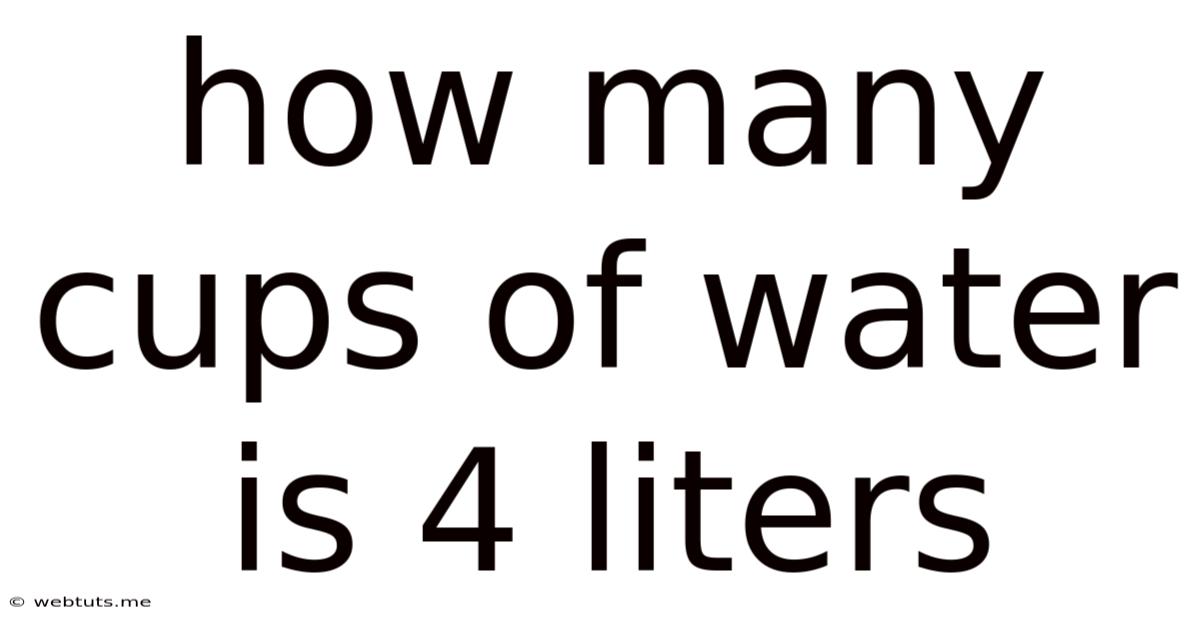How Many Cups Of Water Is 4 Liters
Webtuts
May 11, 2025 · 4 min read

Table of Contents
How Many Cups of Water is 4 Liters? A Comprehensive Guide
Knowing how to convert between different units of measurement is a crucial life skill, especially when it comes to cooking, baking, or simply understanding daily fluid intake. This comprehensive guide will delve deep into the question: How many cups of water is 4 liters? We'll explore the conversion process, discuss the variations depending on cup size, and offer practical applications of this knowledge. We'll also touch upon the importance of hydration and how understanding liquid measurements contributes to a healthier lifestyle.
Understanding the Units: Liters and Cups
Before we jump into the conversion, let's briefly define our units:
-
Liter (L): A metric unit of volume, widely used internationally. One liter is equivalent to 1000 cubic centimeters.
-
Cup (c): A unit of volume used in cooking and baking. However, the size of a "cup" can vary depending on the region and the type of measuring cup used. This is a crucial point to understand when performing conversions.
The Standard Conversion: 4 Liters to US Cups
The most commonly used cup measurement in the United States is the US customary cup. One US cup equals approximately 236.6 milliliters (mL). Therefore, to convert 4 liters to US cups, we follow these steps:
-
Convert liters to milliliters: Since 1 liter equals 1000 mL, 4 liters equals 4000 mL.
-
Divide by milliliters per cup: Divide 4000 mL by 236.6 mL/cup: 4000 mL / 236.6 mL/cup ≈ 16.9 cups.
Therefore, 4 liters is approximately equal to 16.9 US cups. You might round this down to 17 cups for practical purposes in cooking or baking, but keep in mind the slight inaccuracy.
Factors Affecting Accuracy
The accuracy of this conversion hinges on using a standard US measuring cup. Variations in cup size, even slight ones, can lead to measurable differences in the final volume. Using a consistently calibrated measuring cup ensures greater accuracy.
Variations in Cup Sizes: A Deeper Dive
The ambiguity surrounding the "cup" measurement is a significant source of confusion. Different countries and even different measuring sets use varying cup sizes. Let's explore some common variations:
1. Metric Cups
In many parts of the world, metric cups are used. A metric cup is typically 250 mL. Using this definition, the conversion would be:
-
4 liters = 4000 mL
-
4000 mL / 250 mL/cup = 16 cups
This shows a slight difference compared to the US customary cup calculation. This highlights the importance of specifying the type of cup you are using when dealing with conversions.
2. Imperial Cups (UK)
The imperial cup used in the United Kingdom is slightly smaller than the US cup, typically holding approximately 240 mL. The conversion for 4 liters to imperial cups would be:
-
4 liters = 4000 mL
-
4000 mL / 240 mL/cup ≈ 16.7 cups
Again, this demonstrates the subtle yet significant variations in cup sizes impacting the final conversion.
Practical Applications: Cooking, Baking, and Hydration
Understanding the conversion between liters and cups has various practical applications in daily life:
Cooking and Baking
Accurate measurements are essential for successful cooking and baking. Whether you're following a recipe from a foreign cookbook or adjusting a recipe to use different sized containers, knowing how to convert between liters and cups ensures consistent results.
Hydration
Staying properly hydrated is critical for health. Many hydration guidelines recommend daily water intake in liters. Converting this to cups can help individuals monitor their fluid intake more easily using readily available measuring tools. For example, if you're aiming for 2 liters of water daily, that's roughly 8.5 US cups, making it easier to track your consumption.
Other Applications
The knowledge extends beyond cooking and hydration. It’s useful in various other fields like gardening (watering plants), chemistry (measuring reagents), and even in everyday scenarios involving liquid dispensing.
Tips for Accurate Conversions
To minimize errors when converting between liters and cups:
-
Specify the cup type: Always clarify whether you're using a US customary cup, a metric cup, or an imperial cup.
-
Use calibrated measuring cups: Invest in accurate measuring cups to ensure consistent results.
-
Double-check your calculations: It's always a good idea to double-check your work to avoid mistakes.
-
Consider using online converters: Numerous online converters can perform these conversions instantly and accurately. However, understanding the underlying principles remains crucial for better comprehension.
Conclusion: Mastering Liquid Measurements
Converting 4 liters to cups highlights the importance of understanding different units of measurement and the potential for variations. While 4 liters is approximately 16 to 17 cups, the precise number depends on the type of cup used. Mastering these conversions empowers you to follow recipes accurately, monitor your hydration effectively, and confidently tackle various tasks involving liquid measurements. By paying attention to detail and using accurate measuring tools, you can ensure precise results and achieve greater success in your culinary endeavors and overall well-being. Remember, accuracy is key, and understanding the nuances of different cup sizes is crucial for achieving reliable results. So next time you encounter a recipe that uses liters instead of cups, or vice versa, you'll be well-equipped to handle the conversion with confidence.
Latest Posts
Latest Posts
-
How Many Day Until September 5
May 12, 2025
-
90 Days From November 15 2024
May 12, 2025
-
How Far Is 1000 Yards In Miles
May 12, 2025
-
How Many Ounces Is 25 Liters
May 12, 2025
-
How Many Days Until October 17th 2024
May 12, 2025
Related Post
Thank you for visiting our website which covers about How Many Cups Of Water Is 4 Liters . We hope the information provided has been useful to you. Feel free to contact us if you have any questions or need further assistance. See you next time and don't miss to bookmark.